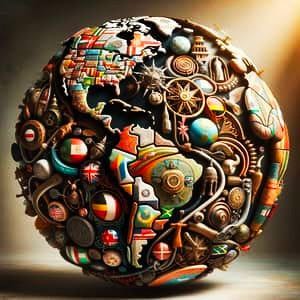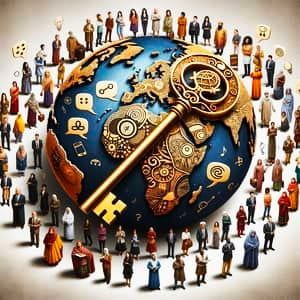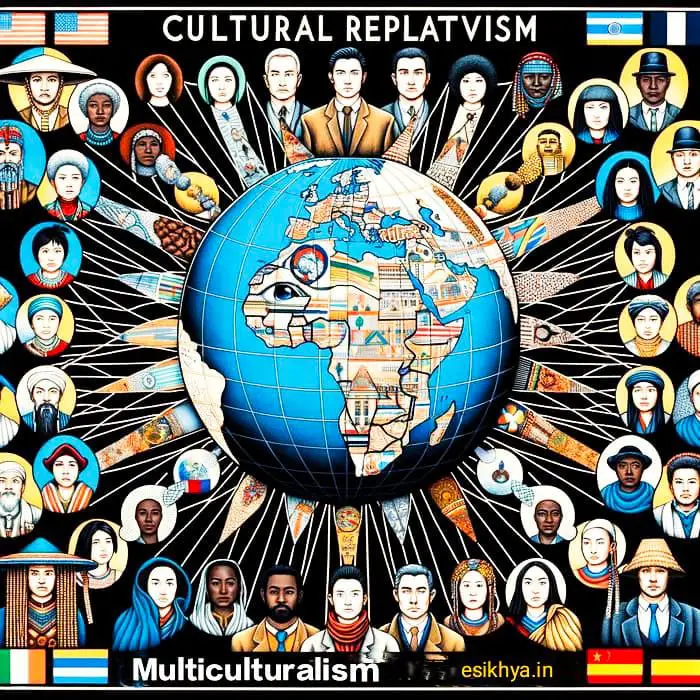Cultural relativism is the idea that a person’s beliefs, values, and practices should be understood based on that person’s own culture, rather than judged against the criteria of another. It emerged in anthropology as a response to ethnocentrism—the tendency to view one’s own culture as superior or the norm.

Key Concepts :
- No Absolute Standards: There are no universal moral standards that apply to all cultures. What is considered right or wrong is culture-specific.
- Understanding vs. Judging: Rather than evaluating other cultures based on one’s own values, cultural relativism encourages understanding practices within their own cultural context.
- Critique of Ethnocentrism: Ethnocentrism places one’s own culture as the standard for evaluating others, whereas cultural relativism argues for cultural diversity and tolerance.
- Limits of Cultural Relativism: Critics argue that cultural relativism can lead to moral indifference. For example, it might prevent people from criticizing harmful practices such as human rights abuses because they are seen as “culturally acceptable.”
- Application in Anthropology: Cultural relativism is central to the practice of ethnography, where anthropologists study cultures without imposing their own biases, seeking instead to understand them on their own terms.

Example :
A common example is the practice of arranged marriages, which might be criticized in one culture but understood as a valuable tradition in another when viewed through the lens of cultural relativism.
This concept is essential in fields like anthropology, philosophy, and international relations, where diverse worldviews interact.
Multiculturalism refers to the coexistence of diverse cultures in a society, where cultural differences are recognized, respected, and celebrated. It is both a demographic reality and a political ideology that advocates for inclusivity and equality among various cultural groups.

Key Concepts :
- Cultural Diversity: Multiculturalism recognizes the presence of multiple cultural groups, including differences in ethnicity, language, religion, and traditions. It promotes a society where diverse cultures can coexist peacefully.
- Cultural Pluralism: Rather than assimilating into a dominant culture, multiculturalism supports cultural pluralism, where each group retains its unique identity while contributing to the larger society.
- Equality and Inclusion: Multicultural policies often aim to ensure equal rights and opportunities for all cultural groups, preventing discrimination and fostering social inclusion.
- Intercultural Dialogue: Multiculturalism encourages dialogue and interaction between cultures, promoting mutual understanding, respect, and cooperation.
- Challenges: Critics argue that multiculturalism can lead to social fragmentation or the isolation of cultural groups, weakening national unity. Others express concerns about cultural relativism and whether some practices should be challenged in a multicultural society.

Models of Multiculturalism :
- Melting Pot: Cultures blend together to form a single, unified society, as often described in the U.S. context.
- Cultural Mosaic: Cultures coexist side by side, maintaining their distinct identities while forming a larger, cohesive whole, as seen in Canada’s multicultural approach.
- Interculturalism: Some countries, like France, prefer interculturalism, where integration and shared values are emphasized while recognizing cultural diversity.
Example :
In Canada, multiculturalism is an official policy that supports the preservation of cultural heritage while encouraging immigrants to integrate into Canadian society. This approach has led to policies that celebrate cultural festivals, languages, and traditions, while promoting social cohesion.
Application :
Multiculturalism is applied in education, immigration policies, and public services, and it plays a crucial role in shaping national identity in countries with diverse populations.

